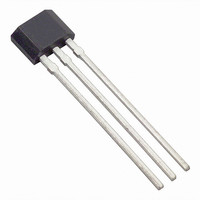US1881LUA Melexis Inc, US1881LUA Datasheet - Page 37

US1881LUA
Manufacturer Part Number
US1881LUA
Description
IC LATCH CMOS MP TO-92UA
Manufacturer
Melexis Inc
Type
Bipolar Latchr
Specifications of US1881LUA
Sensing Range
9.5mT Trip, -9.5mT Release
Voltage - Supply
3.5 V ~ 24 V
Current - Supply
5mA
Current - Output (max)
50mA
Output Type
Digital, Open Drain
Operating Temperature
-40°C ~ 150°C
Package / Case
TO-92UA
Lead Free Status / RoHS Status
Lead free / RoHS Compliant
Features
-
Available stocks
Company
Part Number
Manufacturer
Quantity
Price
Part Number:
US1881LUA
Manufacturer:
MELEXIS/迈来芯
Quantity:
20 000
Part Number:
US1881LUA-AAA-000-BU
Manufacturer:
MELEXIS/迈来芯
Quantity:
20 000
Geartooth Sensor
Magnetic Geartooth Sensing
The need to sense speed and position of ferrous gears occurs in numerous industries. The ability to con-
vert the repetitive passing teeth to an electrical impulse has been sought for many decades. purely
mechanical systems have been used with the attendant issue of wear and failure limiting its use to low
speed and low duty cycle applications.
Hall-Effect geartooth sensing makes use of the Hall element to sense the variation in flux found in the air-
gap between a magnet and passing ferrous gearteeth. A modern approach is to convert the signal from the
Hall element to a digital value and then perform signal processing to create a digital output from that
effort. In the case of the Melexis geartooth sensing scheme each time the signal changes direction a
counter is reset. If the signal level changes beyond the preset magnitude from the positive or negative peak
the output level is changed. This creates a digital zero speed peak detection speed sensor. It is immune to
orientation requirements and cab follow the gear speed down to the cessation of motion. It will detect the
first edge of the next tooth after immediately after power on. The digital signal processing does introduce
an uncertainty from quantization that is greater at larger speeds. Extremely demanding timing require-
ments like those found in crank position sensors may suffer from the loss of accuracy at high speeds.
Figure 24 shows the Melexis MLX90217 geartooth sensor operation.
Figure 24, Geartooth Sensor
Section 3 - Applications
3-23



















